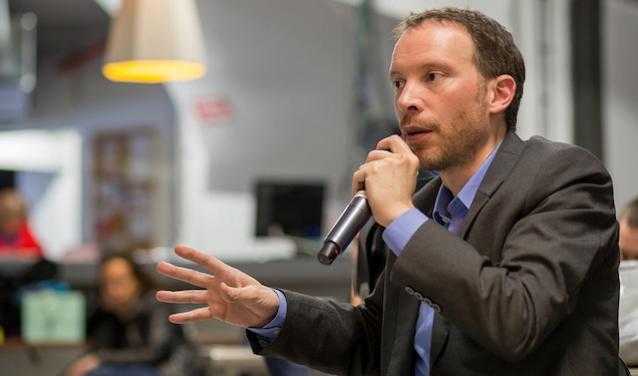Home>“My course aims to shed light on the hidden side of the Internet”

21.06.2017
“My course aims to shed light on the hidden side of the Internet”
Fabrice Epelboin has been running the “Digital Workshop” course at Sciences Po for five years. Appreciated for his outspokenness and innovative teaching, Epelboin is resolved to reveal to students the hidden side of the Internet and awaken them to the huge democratic and economic issues at stake.
Epelboin, 46, may have dark shadows under his eyes after a night working; he nonetheless belies the hacker clichés. With a father at IBM, he received his first computer at the age of eleven and was a web pioneer in the 1990s, but he is not enthusiastic about the way the Internet is developing. “The discourse on digital technology is monopolised by dreamers!” he exclaimed bluntly. Epelboin admits that ten years ago, he was full of “blind enthusiasm.” “But today,” he said, “those who are critical of the subject go largely unheeded in France. People pay more attention to the enthusiasts who promise the earth.”
Coming out of the cave
What he promises his students is quite a different challenge: to come out of the cave. “The whole explanation of the Internet that we usually hear, that's marketed to us, is just shadows in a cave,” said Epelboin. “We can see shapes, but what we have to see is the reality behind them, and it's not very nice.”
For two hours a week, he plunges his audience into an invisible yet very real world of industrial espionage, data collection and the darknet, with videos and figures to illustrate.
To delve deeper into these subjects, Epelboin doesn’t ask his students for presentations or fact sheets. This year's assignment was to draft an “information bomb” for a foreign head of state designed to digitally sabotage the French presidential election. Students had strict instructions not to resort to trending fake news, but rather to find and exploit real information based on Wikileaks revelations.
“The challenge is to understand the tactical approach of nations like Russia or organisations like Wikileaks,” he explained.
The second hour of his class is given over to intense debate, which his students greatly appreciate. “It’s all too rare for us to be confronted with the realities of the digital world,” said Eva Kwamou Feukeu, a master's student in economic law who took the course last autumn. “We know that there are issues, that cyberwars are in the offing, but that's all. The course's main strength was to make us face up to what's really going on.” Since she finished the course, Eva has been desperate to learn to code.
Another exercise Epelboin sets is producing memes, the famous images subverted humoristically and spread en masse, often for a political purpose. “It’s a way to get a message across almost instantaneously to a very wide audience, with nothing more than a Twitter account,” he said. “The internet gave rise to new means of expression, which played an important part in Donald Trump's election win.”
“The far right is a generation ahead”
However digital the course may be, it is no less political, with an underlying concern for the all-powerful far-right community that plagues the web and haunts the forums. “They're a generation ahead of their opponents,” said Epelboin, who believes Marine Le Pen will inevitably come to power by 2022. “They were censored in the media fifteen years ago, so they took refuge on the Internet, developing codes to deliver a message that was quickly understood,” he explained. “They also learned the art of doing dialectics in a manner suited to social media.”
Having worked with Wikileaks and taken part in the 2010 Tunisian revolution by helping hackers from across the Mediterranean, Epelboin is well aware of the enormous influence that a few individuals can have by digital means. Among the many concepts explored over the semester, his students discovered “astroturfing”: a small group creating multiple accounts on social networks and websites to give artificial weight to an opinion, or even trigger a movement.
“Some people find my course hard to take,” admitted Epelboin, who “has spent his life founding companies and startups” in communication, media and now IT security. After surfing the digital wave in the early 2000s, Epelboin now puts across a disillusioned view of a world given over to mass surveillance. “To combine democracy, trust and surveillance is illusory,” he said. “We will have to reinvent everything or resign ourselves to seeing the death of democracy.”
Even so, he continues to teach with genuine enthusiasm, especially for Sciences Po's international students. “I don't have children, so I get to have contact with young people that I wouldn't have otherwise and discover very diverse points of view according to students’ countries of origin. And the best memories I have is when I meet alumni a few years later and see that their view of the digital world has changed!”
Noé Michalon - Sciences Po School of Journalism
Related Links